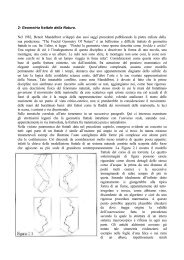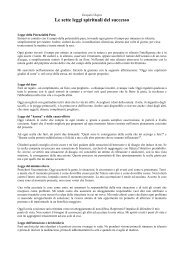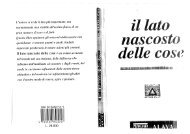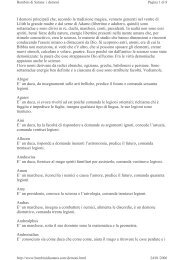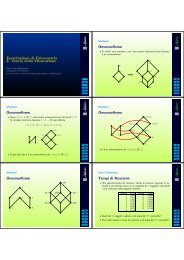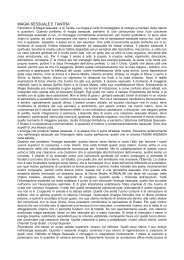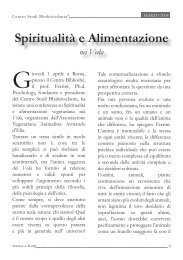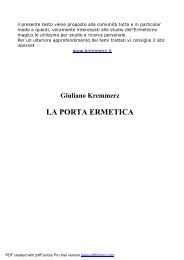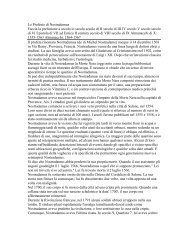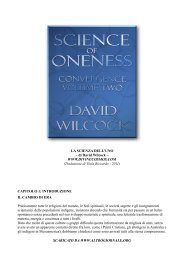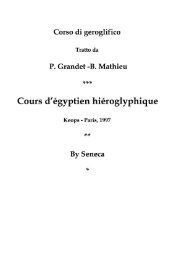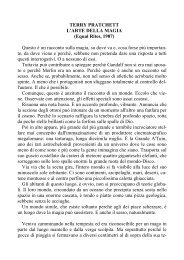212 ~ TALIBANto build a civil society that is just and equitable in which rulers areresponsible for their citizens - is forgotten.The genius of early Muslim-Arab civilization was its multi-cultural,multi-religious and multi-ethnic diversity. The stunning and numerousstate failures that abound in the Muslim world today are because thatoriginal path, that intention and inspiration, has been abandoned eitherin favour of brute dictatorship or a narrow interpretation of theology.Muslim history has been a cycle of conquest, renewal and defeat. 'Perhapsit has been the destiny of Islam to attract and use the primitive peopleswho surround or cross its territory, but then to fall prey to their violentpower. Ultimately order is restored and wounds are healed. The successfulprimitive warrior is tamed by the all-powerful urban life of Islam,' wroteFerdinand Braudel. 8Following this Muslim tradition, could the Taliban also change or moderatetheir policies and absorb Afghanistan's rich ethnic and culturaldiversity to become the country's legitimate rulers? In their present formthat is unlikely. The Taliban are essentially caught between a tribal societywhich they try to ignore and the need for a state structure which theyrefuse to establish. Tribal fragmentation amongst the Pashtuns is alreadycoming back to haunt them as they fail to satisfy even the local demandsof power-sharing, while they ignore the non-Pashtuns. This was never thecase in the past. 'Despite the seeming dominance of the Pashtuns, theactual process of state-building entailed the participation of the elite ofall the ethnic groups and a prominent role played by non-Pastuns in boththe bureaucracy and the military,' writes Afghan scholar Ashraf Ghani. 9The Taliban are bucking the entire trend of Afghan history because theyhave no understanding of it.At the same time, the Taliban refuse to define the Afghan state theywant to constitute and rule over, largely because they have no idea whatthey want. The lack of a central authority, state organizations, a methodologyfor command and control and mechanisms which can reflect somelevel of popular participatation (Loya Jirga or Islamic Shura orparliament), make it impossible for many Afghans to accept the Talibanor for the outside world to recognize a Taliban government. There canbe no effective government unless there is a common, acceptable definitionof what kind of state is now required to heal the wounds of war. Butthe Kandahari group around Mullah Omar brooks no outsiders and noadvice. Divisions within the Taliban are multiplying fast and it is notunlikely that more moderate Taliban may mount a coup against MullahOmar and the Kandahari ukma.No warlord faction has ever felt itself responsible for the civilian population,but the Taliban are incapable of carrying out even the minimumof developmental work because they believe that Islam will take care ofCONCLUSION: THE FUTURE OF AFGHANISTAN ~ 213everyone. This has raised fundamental questions for the UN and theNGO community - that humanitarian aid is in fact prolonging the civilwar because foreign aid keeps the population alive, absolving the warlordsof the responsibility of having to provide for the people and allowingthem to channel all their resources into the war effort. This dilemma isnow common for the UN and aid agencies in other failed states such asSudan and Somalia and presents the greatest challenge to the internationalhumanitarian community in the future.It seems that the only effective Afghan NGO is based on organizedsmuggling and the drugs trade. Thus the limited reconstruction which theTaliban has undertaken so far is entirely related to improving the efficiencyof smuggling and drugs trafficking, such as repairing roads, settingup petrol pumps and inviting US businessmen to set up a mobile telephonenetwork which will qualitatively speed up the movement of drugsand illicit trade. The benefits of this reconstruction all accrue to the transportand drugs mafia. No warlord is building schools, hospitals, watersupply systems or anything remotely related to civic development.In their present form, the Taliban cannot hope to rule Afghanistanand be recognized by the international community. Even if they were toconquer the north, it would not bring stability, only continuing guerrillawar by the non-Pashtuns, but this time from bases in Central Asia andIran which would further destabilize the region. Yet in the Pashtun beltof Afghanistan, the only alternative to the Taliban is further disorder andchaos. 'The majority of Afghans south of Kabul would most probablyagree that the Taliban, although not as popular today as when they came,are better for the people, their security and welfare, compared to whatwas there before them and that there is no real alternative but anarchy.' 10The Taliban cannot be wished away, but a more likely scenario is thatthe Taliban will form factions with separate and rival Taliban fiefdoms inKabul, Kandahar and possibly Herat.The anti-Taliban alliance is incapable of conquering or ruling over thesouthern Pashtun region. So far Masud has proved unable to galvanizeenough Pashtuns who reject the Taliban and who would give him somenational legitimacy. The opposition's only chance for survival depends onwinning over sections of the Pashtuns, which will doubtless prolong thewar, but also weaken the Taliban and offer the possibility that both sidescould then negotiate. The anti-Taliban alliance has also failed to set upminimum state structures or a representative leadership which absorbseven all the non-Pashtuns. Their bickering, internal differences and leadershippower struggles have decimated them in the eyes of many Afghans,who may loathe the Taliban but have no faith in the anti-Taliban allianceeither.The fear of fragmentation is ever present and the lines have been well
214 ~ TALIBANdrawn since 1996 - a Pashtun south under the Taliban and a non-Pashtunnorth divided by the Hindu Kush mountains, leaving Kabul contested bythe two sides. With the devastating massacres, sectarian pogroms andethnic cleansing in so many areas, the chances of fragmentation appearextremely high. Fortunately there is no Slobodan Milosevic or SaddamHussein amongst the warlords, who would be prepared to preserve powerand their fiefdoms at the expense of partition of the country. Despitetheir interference, fragmentation suits none of Afghanistan's neighboursbecause it would open a Pandora's box of ethnicity that would rapidlyspill across Afghanistan's borders, create massive refugee influxes and furtherspread the culture of drugs, weapons and Islamic fundamentalism intheir already fragile states. Formal fragamentation and even partition ofthe Afghan state is still possible, but so far none of the players desire it.That is the one positive hope for the future of the peace process.Peace-making by the UN has so far failed to yield any dividends, butnot for lack of trying. The reason is simply that as long as outside powersfuel the warlords with money and weapons, the civil war does not have alikelihood of winding down. A possible solution might lie in a processwhich would have to begin from outside Afghanistan. All the regionalstates would first have to agree to an arms embargo on Afghanistan,implement it sincerely and allow it to be monitored by the UN effectively.The regional states would have to accept limited areas of influence inAfghanistan rather than continuing to push for their proxies to rule theentire country. An Iran-Pakistan dialogue would be essential in whichPakistan would accept limiting its influence to the Pashtun belt, whileIran accept the same in western and central Afghanistan with guaranteesfor the Shia minority.In short, each neighbouring state would have to recognize not only itsown national security needs, but also those of its neighbours. Outsideinfluence cannot now be eliminated in Afghanistan, but it must be containedand limited with mutual agreement to acceptable levels. No neighbouringcountry can presume to undermine the acknowledged securityinterests of its neighbours. Negotiating such agreements would beextremely tricky because they would involve not just diplomats, but themilitary and intelligence officials of each state. The UN and the internationalcommunity would also have to guarantee that such agreementswould not be furthering the future disintegration of Afghanistan or interferingwith the process of government formation inside Afghanistan.Afghanistan's internal settlement can no longer be achieved by whatis euphemistically called 'a broad-based government.' There is no possibilitythat Mullah Omar and Masud are going to be able to agree to sit downin Kabul and rule together. Instead, what is needed is a cease-fire, a weakcentral government for an initial period, the agreed demilitarization ofCONCLUSION: THE FUTURE OF AFGHANISTAN ~ 215Kabul and a high degree of autonomy in the regions controlled by thefactions. All the factions would have to agree to build up a strengthenedcentral government in the long term, while maintaining their own autonomyin the short term. In this way, they would retain their independentmilitary units, but would also contribute to a central policing force inKabul.The factions would receive outside aid for reconstruction on an independentbasis, but work together through the central government torebuild the country's shattered infrastructure. This would in turn generategreater confidence and understanding between them. All the factionswould then have to agree to set in motion some form of legitimizingprocess through elected or chosen representative bodies in their regions,which ultimately could lead to a central Jirga or Shura in Kabul.It cannot be underestimated how difficult it would be to negotiate suchagreements, given that at present there is no will among the belligerentsto negotiate. One lure could be a substantial reconstruction package puttogether by international donors, the World Bank or large private charities,which would not be disbursed until there was a minimum agreement.This would essentially be a bribe for the warlords and an incentive forthe Afghan people to pressurize them to accept an agreement. Any seriouspeace process would need much greater commitment to peace-making inAfghanistan from the international community than it has shown so far.Peace in Afghanistan would pay enormous dividends across the entireregion. Pakistan would benefit economically from the reconstruction inAfghanistan and it could begin to tackle the leftovers of the Afghan waron its own soil - the proliferation of weapons, drugs, terrorism, sectarianismand the black economy. Pakistan's diplomatic isolation in the regionwould end and it could reintegrate itself into the Central Asian networkof communication links, offering as it does the shortest route to the sea.Iran would return to its position in the world community and its role asa great trading state at the centre of South Asia, Central Asia and theMiddle East. Turkey would have links and commercial ties to Turkicpeoples in Afghanistan with whom it has a historical connection.China would feel more secure and be able to carry out a more effectiveeconomic development programme in its deprived Muslim province ofXinjiang. Russia could build a more realistic relationship with Centraland South Asia based on economic realities rather than false hegemonicambitions, while laying its Afghan ghosts to rest. Oil and gas pipelinescrossing Afghanistan would link the country into the region and speedup foreign assistance for its reconstruction. The USA could evolve a morerealistic Central Asian policy, access the region's energy in a securerenvironment and deal with the threat of terrorism.But if the war in Afghanistan continues to be ignored we can only
- Page 1 and 2:
YALE NOTA BENE"The broader storyher
- Page 3 and 4:
TalibanMilitant Islam,Oil and Funda
- Page 5 and 6:
Vi ~ CONTENTSChapter 8A Vanished Ge
- Page 7 and 8:
AFGHANISTAN•^ UZBEKISTAN J TAJIKI
- Page 9 and 10:
2 ~ TALIBANaccounts for some 40 per
- Page 11 and 12:
"6 ~ TALIBANgas riches of landlocke
- Page 13 and 14:
10 ~ TALIBANgious mix that was to m
- Page 15 and 16:
Part 1History of theTaliban Movemen
- Page 17 and 18:
18 ~ ISLAM OIL AND THE NEW GREAT GA
- Page 19 and 20:
22 ~ ISLAM OIL AND THE NEW GREAT GA
- Page 21 and 22:
26 ~ ISLAM OIL AND THE NEW GREAT GA
- Page 23 and 24:
30 ~ ISLAM OIL AND THE NEW GREAT GA
- Page 25 and 26:
34 TALIBANKabul- Hikmetyar had alli
- Page 27 and 28:
38 ~ TALIBANrHERAT 1995: GOD'S INVI
- Page 29 and 30:
42 ~ TALIBANdo manage to take Kabul
- Page 31 and 32:
J46 ~ TALIBANgreater weight to UN e
- Page 33 and 34:
50 ~ TALIBANas they hung from steel
- Page 35 and 36:
54 ~ TALIBANthey would help rearm t
- Page 37 and 38:
58 TALIBANGul Mohammed Pahlawan, Gh
- Page 39 and 40:
62 TALIBAN2,500 Taliban, who had re
- Page 41 and 42:
66 TALIBANshould throw all aid agen
- Page 43 and 44:
70 ~ TALIBANyears of battle and hel
- Page 45 and 46:
74 ~ TALIBANThousands of Hazaras we
- Page 47 and 48:
78 TALIBANhas become a plague,' sai
- Page 49 and 50:
NEW STYLE FUNDAMENTALISM OF THE TAL
- Page 51 and 52:
86 TALIBANsity students - Hikmetyar
- Page 53 and 54:
90 TALIBANSharia was heavily influe
- Page 55 and 56:
94 TALIBANinflamed the debate in th
- Page 57 and 58:
98 TALIBANizing factor of Islam, it
- Page 59 and 60:
102 TALIBANadministrations made the
- Page 61 and 62:
106 ~ TAUBANfrom working, but it no
- Page 63 and 64: TALIBANUniversity, she held down a
- Page 65 and 66: 114 TALIBAN A VANISHED GENDER 115Ta
- Page 67 and 68: 118 TALIBANUS$1,300 - a small fortu
- Page 69 and 70: 122 TALIBANper cent of the total Pa
- Page 71 and 72: 126 TALIBANequipment, no electricit
- Page 73 and 74: 130 ~ TALIBANfight with the Mujahed
- Page 75 and 76: 134TALIBANAugust 1996 noted that Bi
- Page 77 and 78: 138 ~ TALIBANwho were using the Kho
- Page 79 and 80: 11DICTATORS AND OILBARONS: THE TALI
- Page 81 and 82: 146 TALIBAN DICTATORS AND OIL BARON
- Page 83 and 84: 150 — TALIBANgrowth of beards and
- Page 85 and 86: 154TALIBAN1998 when international o
- Page 87 and 88: 158 ~ TALIBANaround Afghanistan? Af
- Page 89 and 90: 162 TALIBAN ROMANCING THE TALIBAN 1
- Page 91 and 92: 166 TALIBAN ROMANCING THE TALIBAN 1
- Page 93 and 94: ROMANCING THE TALIBAN 2: 1997-99 17
- Page 95 and 96: 174 — TALIBANnon-Russian pipeline
- Page 97 and 98: 178 — TALIBANROMANCING THE TALIBA
- Page 99 and 100: 182 ~ TALIBANApril 1999. 'The US ha
- Page 101 and 102: 186 ~ TALIBANters or the transport
- Page 103 and 104: 190 ~ TALIBANThis Wild West of free
- Page 105 and 106: 194 ~ TALIBANgovernance. Pakistani
- Page 107 and 108: 198 TALIBAN SHIA VERSUS SUNNI: IRAN
- Page 109 and 110: 202 TALIBAN SHIA VERSUS SUNNI: IRAN
- Page 111 and 112: 206 — TALIBANin Afghanistan - to
- Page 113: 210 — TALIBANand antagonism. The
- Page 117 and 118: 218 ~ TALIBANated and severely puni
- Page 119 and 120: Origins of Members of the Taliban M
- Page 121 and 122: APPENDIX 3 ~ 227Appendix 3A CHRONOL
- Page 123 and 124: 230 ~ TALIBANgraves near Shebarghan
- Page 125 and 126: 234 ~ TALIBAN8 June. US FBI places
- Page 127 and 128: 238 ~ TALIBAN1995 January16 MarchAp
- Page 129 and 130: 242 ~ TALIBANJune21 August10 Septem
- Page 131 and 132: 246 ~ TALIBANDupree, Nancy Hatch, A
- Page 133 and 134: 250 ~ NOTESChapter 31 Interview wit
- Page 135 and 136: 254 ~ NOTESmuddin, Religious Police
- Page 137 and 138: 258 NOTES13. The Japanese company M
- Page 139 and 140: 262 ~ NOTES28. Waxman, Sharon, 'A c
- Page 141 and 142: Abbas, Mulla Mohammed 22,61,100Abda
- Page 143 and 144: INDEX - 270Hazaras (continued)burea
- Page 145 and 146: INDEX ~ 274nF»r\/FaliViar» milita
- Page 147: INDEX ~ 278Talibans (continued)Sunn




